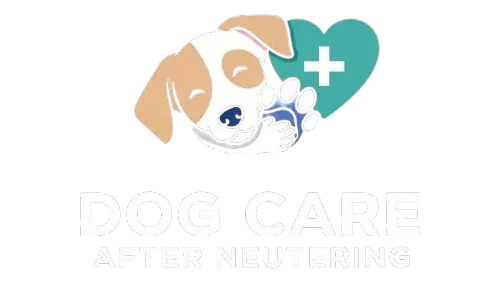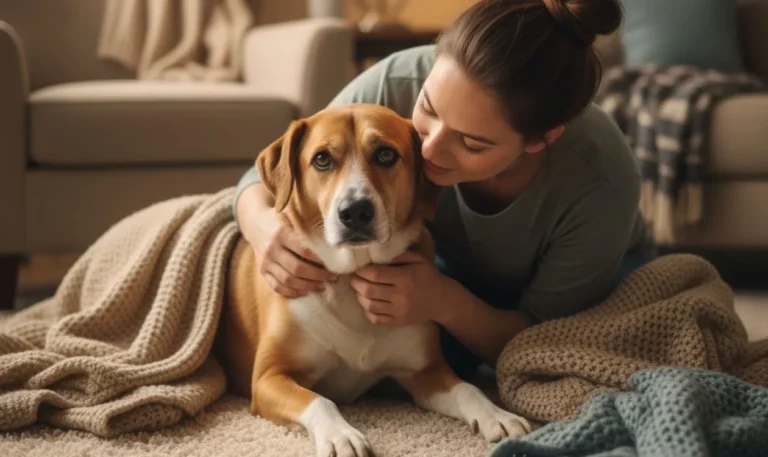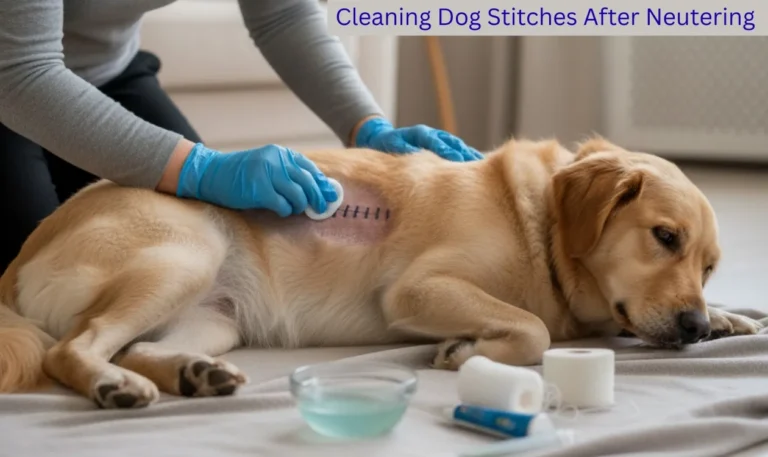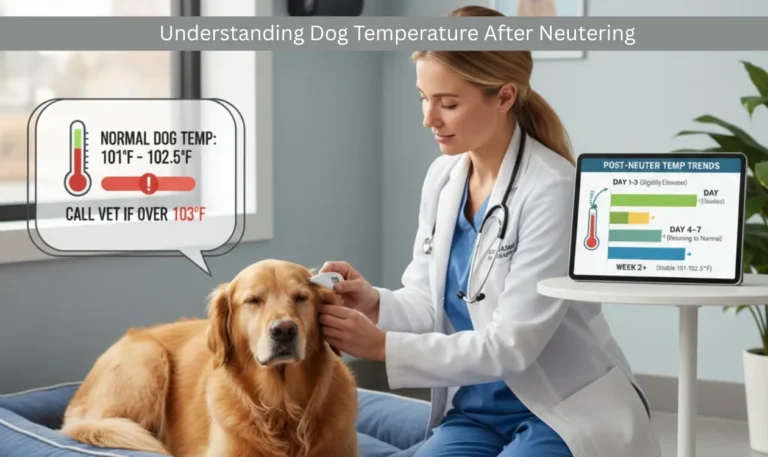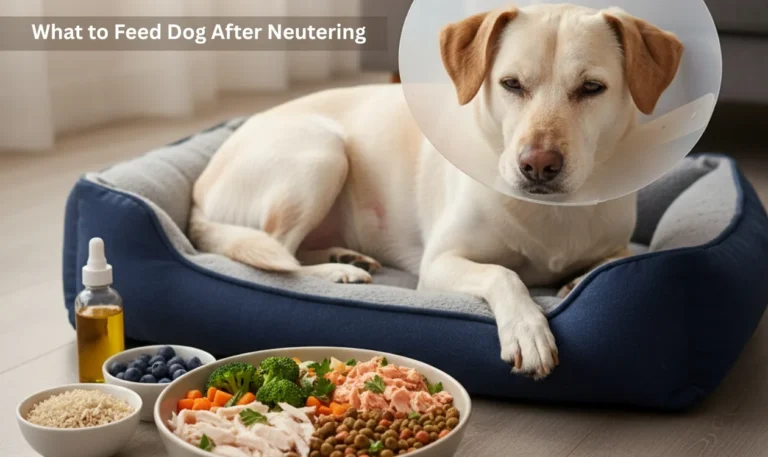The Neutered Dog Foods to Avoid : A Nutrition and Feeding Guide
The Neutered Dog Foods to Avoid A Nutrition and Feeding Guide explains which foods to avoid, helping keep your neutered dog healthy, safe, and nutritionally balanced
When your favorite pet is neutered the nutritional requirement changes dramatically. Hormonal fluctuations decrease metabolism, anorexia can be noted, and the danger of gaining weight or abdominal discomfort becomes a reality.
Educating yourself on what not to feed your companion is important as well as having a well-planned diet which will ensure your companion is healthy and comfortable. This blog is devoted to the foods to avoid following the neutering, with the help of reliable nutrition knowledge and caring instructions.
Understanding the post-neutering nutritional shift
A pet, after neutering, undergoes hormonal and metabolic changes in the body. The decreased amount of sex hormones usually decelerates metabolism and can change appetite and energy use. This requires caloric intake to be modified, and foods that encourage fat accumulation or digestive stress must be restricted according to veterinary nutrition guidelines. Such physiological adjustments are essential for maintaining long-term health.
Also, neutered pets are more likely to become overweight in case their diet is not modified. A manufacturer says that a dog can put on as much as 10 percent of its body weight within the three weeks after it is neutered unless measures are taken to modify it. You should select food properly to facilitate optimal recovery and long-term health and not feed on products that add to the excess calories, allergy or digestive stress.
Why foods to avoid matter
The improper feeding after neutering may increase common problems such as obesity, stressed joints, urinary tract complications, or stomach disorders. Excess starches, sugars, or fats in the diet can be stored as fat rather than used as energy. Choosing the right Neutered Dog Food helps prevent these issues by supporting balanced nutrition, healthy weight, and proper digestion during recovery
In many cases, neutered pets become more prone to snacking, getting tempted by the scraps, or getting overloaded with high-calorie consumption. That is why it is equally valuable to define what not to do as the selection of what to feed. Such a special treatment of limited foods will help you avoid pitfalls and keep your pet in good condition.
High-fat and greasy human foods
After neutering, it becomes especially risky to feed human scraps such as fatty meats, fried foods, or greasy leftovers. Because your pet is undergoing significant metabolic changes, excess fat is more likely to be stored, and rich foods may trigger digestive problems like pancreatitis or obesity. Avoiding such contraindicated foods is essential to protect your dog’s long-term health.
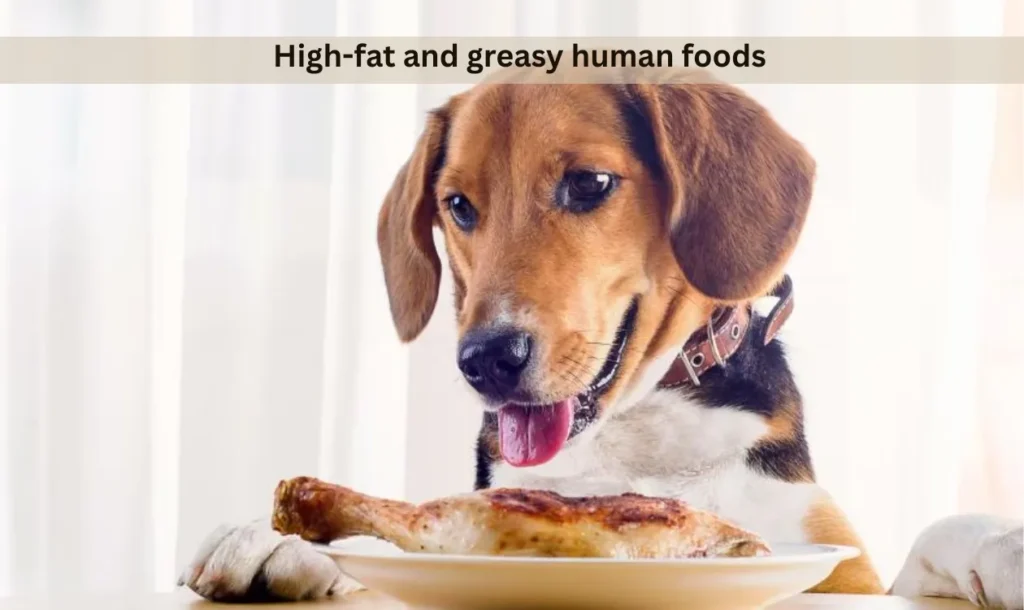
Foods such as bacon, heavy gravy-smeared foods, fatty steak scraps, and meat left overs that have undergone extensive processing should be avoided. These foods do not cater to the altered physiology of a pet after the procedure of neutering, and will overload the nutrient balance of a pet. Rather, there are lean proteins and regulated portions.
Snacks and sweets that are made of sugar and starch
Snacks with high starch content and sweets were more problematic with neutered pets who tend to burn fewer calories. Sustaining cookies, sweet breads or high-carbohydrate table scraps can cause a rapid rise of energy consumption without provision of the right nutrients. The result? The possible weight gain and disproportion of the body structure.
Starchy foods like white bread, pastries, or large amounts of potatoes (especially when fried or buttered) should be avoided. These foods can disrupt digestion, leading to bloating or irregular bowel movements. It is better to shift focus toward vegetables that contain fiber and moderate complex carbohydrates, as they support healthier digestion during recovery. Avoiding such indigestible foods helps protect your neutered dog from discomfort and weight gain.
Toxic foods and harmful human staples
Not just calories, but certain foods are simply bad to pets, particularly at times when their bodies are still recuperating following a surgery. Other products like chocolate, grapes/raisins, onions, garlic, and xylitol-sweetened products are categorically harmful to the health of the digestive system and organs.
Exposure to these poisonous substances is particularly risky after neutering, when the body of your pet can be more exposed, and when the animal is in the process of healing. Store them away and never give them the remains of the table without first checking that the food is pet safe.
Foods heavy in simple grains and fillers
Although grains are not bad as such, pets will find diets containing moderate amounts of carbohydrates, elevated amounts of protein and increased amounts of fibre useful after neutering. Based on nutrition recommendations of sterilised animals, diets high in simple grains or starches, (corn, wheat, high quantities of rice) may not respond to the metabolic slowdown observed after neutering.
Do not feed your dog too much bread, plain rice bowls, or large portions of human pasta. These foods can replace higher-quality proteins and essential nutrients, leading to an unnecessary energy surplus. Instead, choose balanced meals formulated specifically for neutered pets or prepare home-cooked meals tailored to their changed requirements. Providing such nutritionally-appropriate diets ensures healthier weight management and long-term well-being.
Table scraps, rich sauces, and human seasoning
It is also an ordinary practice to give pets what you are eating but more dangerous when they are neutered. Table scraps usually harbor concealed fats, salt, seasonings, sauces, onion or garlic powder all of which can upset the digestive system or contribute to erroneous calorie intake. According to the veterinary guidelines, such things as salt, bread, human-cooked reinforcements are to be minimised.
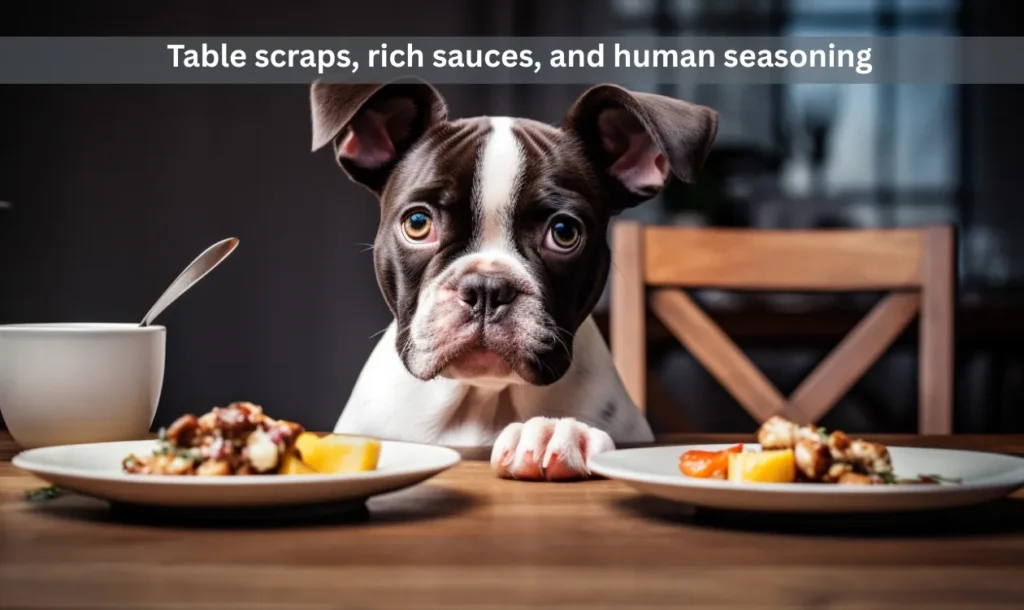
You should avoid giving a treat, but in case you feel the need to do that, it is better to be plain, low fat, and portion controlled. Avoid meats drenched in gravy, huge amounts of cooked leftovers or eating with someone who does not know the ingredients. This is to maintain a clean diet of your pet so that it is predictable and appropriate at the after-neutering stage.
Large meals / free-feeding of calorie-dense foods
It is not just what you feed but how you feed that matters. Neutering results in a reduced energy demand among the pets. The organisation which makes these guidelines observes that dogs which are neutered should have a caloric intake that is 20 percent or higher than of intact pets of similar size.
Free-feeding or large meals that contain high amounts of calories predispose one to gain weight fast. Avoid pouring rich foods of the human grade, adding extra snacks to the actual meals, or having snacks with a high calorie amount available. Rather have weighed meals, preferably divided into two or three small feedings every day.
Raw or under-cooked items and unbalanced home cooking
Other owners change to home cooked food on neutering, although without proper preparation this may result in nutrient imbalance. Raw meats, half-cooked beans or legumes or incomplete meal mixtures may cause stress to digestion or omit the needed nutrients. It has been advised that unprocessed or complicated domestic foods should be monitored.
Large portions of raw meat should not be fed without veterinary nutrition advice, and unbalanced beans or legumes should not be fed that contain lectins in large proportions, and homemade food containing high amounts of starch and low amounts of protein should not be eaten. In case of home cooking, consult a nutritionist or veterinarian to make diets according to the needs of post-neutralization.
FAQs: The Neutered Dog Foods to Avoid
Final Thoughts
Having neutered your pet, its nutrition requirements are different and change slightly but significantly. High-fat, high sugar and processed foods are better avoided to control their slower metabolism and aid in steady recovery. Diet is very important not only to avoid fatness, but also to make your pet happy, comfortable, and active as long as possible.
Good nutrition is a caring and responsible gesture. With the selection of well-balanced, vetted meals and the avoidance of risky or energy-dense food, you are guaranteeing the well-being of your pet in the long-term. Even minor and conscious changes in the present day would make a significant impact on the general well-being, vitality and life quality of your pet after neutering.
